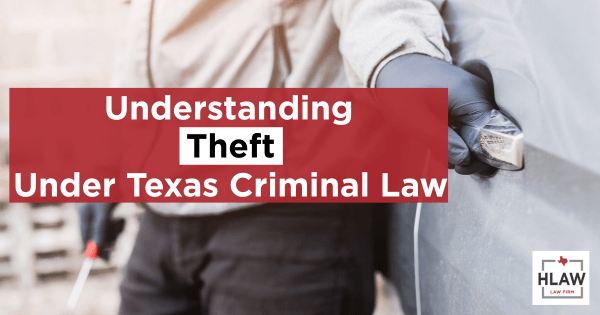
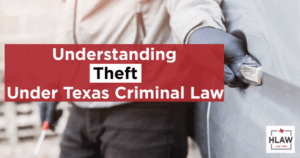
Know your rights: Theft charges in Texas range from petty shoplifting to felony offenses—get the legal defense you deserve.
In Texas, theft is defined under Texas Penal Code § 31.03 as the unlawful appropriation of property with intent to deprive the owner of it. But that simple definition masks a wide range of possible charges—from shoplifting a T-shirt to stealing corporate funds. The consequences vary significantly depending on the value of the property, the method of theft, and whether aggravating factors are involved.
In this guide, we break down the different types of theft charges in Texas, the applicable laws, penalties, and why having an experienced Texas theft defense attorney is critical to protecting your rights.
Types of Theft Charges in Texas
1. Misdemeanor Theft (Sometimes Referred to as “Petty Theft”)
Legal Definition: Theft of property valued at less than $2,500, under Tex. Penal Code § 31.03(e).
Charge Level and Penalties:
- Class C Misdemeanor: Property worth less than $100
• Fine up to $500 - Class B Misdemeanor: $100 to $749 or if the defendant has a prior theft conviction
• Up to 180 days in jail and a $2,000 fine - Class A Misdemeanor: $750 to $2,499
• Up to 1 year in county jail and a $4,000 fine
2. Felony Theft (Including Aggravated Theft)
Legal Definition: Theft becomes a felony when the value of the stolen property exceeds $2,500 or involves certain protected items, like firearms, livestock, or election ballots.
Felony Theft Levels:
- State Jail Felony: $2,500–$29,999
• 180 days to 2 years in state jail, up to $10,000 fine - Third-Degree Felony: $30,000–$149,999
• 2–10 years in prison
Second-Degree Felony: $150,000–$299,999
• 2–20 years in prison - First-Degree Felony: $300,000 or more
• 5–99 years or life imprisonment
Aggravating Circumstances:
- Offense against elderly or nonprofit entities
- Use of deception or breach of fiduciary duty
- Use of a weapon (often charged separately or elevates to robbery)
3. Robbery and Burglary: Theft With Force or Intrusion
Although distinct offenses, robbery and burglary often stem from theft-related conduct and are charged under separate statutes:
Robbery – Tex. Penal Code § 29.02
- Involves intentionally or knowingly causing bodily injury or threatening another while committing theft.
- Second-Degree Felony: 2–20 years in prison
Aggravated Robbery – Tex. Penal Code § 29.03
- Use of a deadly weapon, serious bodily injury, or offense against elderly/disabled person.
- First-Degree Felony: 5–99 years or life imprisonment
Burglary – Tex. Penal Code § 30.02
- Entering a building without consent with intent to commit theft, assault, or another felony.
- Can range from a State Jail Felony (uninhabited buildings) to a First-Degree Felony (habitations with intent to commit felony).
4. Shoplifting
Shoplifting is a form of theft prosecuted under the same § 31.03 statute, but it frequently involves unique elements like store surveillance, witness statements, and security procedures.
Factors Affecting the Charge:
- Value of merchandise
- Use of devices to shield items from detection (which may elevate charge to Organized Retail Theft under Tex. Penal Code § 31.16)
- Prior convictions can increase punishment range
Diversion Programs: In some counties (and in Tarrant County, Texas), first-time offenders may be eligible for pretrial diversion or deferred adjudication, avoiding a conviction if successfully completed.
5. Receiving or Possessing Stolen Property
Texas law treats knowingly receiving or possessing stolen property the same as stealing it, under Tex. Penal Code § 31.03(b).
Prosecution Must Prove:
- Property was stolen
- Defendant knew or should have known it was stolen
Penalty Level: Based on value of property and criminal history, ranges from Class C misdemeanor to first-degree felony
Penalties for Theft in Texas: A Breakdown
- Value of Property: The main driver of the charge level—from minor fines to multi-decade prison sentences.
- Prior Convictions: Repeat offenses often elevate even low-value thefts to higher classes of misdemeanors or felonies.
- Special Victims or Circumstances:
- Nonprofits, elderly, or public servants may trigger enhanced penalties under Tex. Penal Code § 31.03(f)
- Restitution and Civil Liability: Courts often order restitution, and under the Texas Theft Liability Act (Tex. Civ. Prac. & Rem. Code § 134.001), victims can sue offenders for civil damages.
Why You Need a Skilled Theft Defense Attorney in Texas
Theft charges may seem straightforward, but legal defenses are often nuanced:
- Lack of intent to permanently deprive
- Mistake of fact (believing the item belonged to you)
- Illegal search or seizure (4th Amendment violations)
- Coercion or duress
An experienced Texas theft lawyer can:
- Assess the prosecution’s evidence
- Challenge constitutional violations
- Negotiate a reduction or dismissal
- Fight for a favorable plea or trial outcome
At the HLAW Firm, we take a client-centered approach to every criminal case. Whether you’re a first-time offender or facing felony theft, we’re here to protect your rights and your future.
Conclusion
Theft charges in Texas cover a wide spectrum—from simple shoplifting to major corporate embezzlement. But regardless of the value or circumstances, a conviction can carry serious consequences for your freedom, record, and reputation.
If you’re facing any type of theft charge, don’t navigate the legal system alone. Contact the HLAW Firm today to schedule a confidential case review and get the strong, experienced representation you deserve.


 Throughout the year, package thefts occur on a fairly regular basis. But, as Christmas draws near and package delivery increases, so too do the thefts. While packages left on doorsteps and out in the open may seem to be easy targets for thieves, the consequences of getting caught are rarely considered. Would-be porch pirates should certainly think through their intended capers as many houses are equipped with doorbell cameras these days that capture clear video of any movement at or near the doorway.
Throughout the year, package thefts occur on a fairly regular basis. But, as Christmas draws near and package delivery increases, so too do the thefts. While packages left on doorsteps and out in the open may seem to be easy targets for thieves, the consequences of getting caught are rarely considered. Would-be porch pirates should certainly think through their intended capers as many houses are equipped with doorbell cameras these days that capture clear video of any movement at or near the doorway.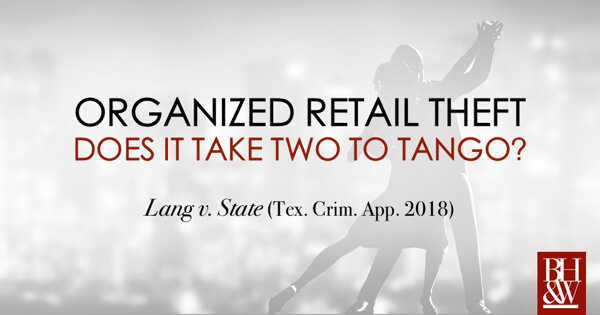
 The Court of Criminal Appeals recently handed down an opinion on the applicability of Texas’ organized retail theft statute. The issue facing the court was whether the statute defining the offense of organized retail theft permits a conviction for ordinary shoplifting by a single actor rather than requiring a group or collaborative effort.
The Court of Criminal Appeals recently handed down an opinion on the applicability of Texas’ organized retail theft statute. The issue facing the court was whether the statute defining the offense of organized retail theft permits a conviction for ordinary shoplifting by a single actor rather than requiring a group or collaborative effort.
 The Court of Criminal Appeals recently handed down a case regarding a police officer’s findings of reasonable suspicion and probable cause. The issue was whether an officer had probable cause to arrest a customer for theft from a store before she actually exited the store and when she claimed, after being confronted by the officer, that she was going to pay for the items shad had placed in her purse.
The Court of Criminal Appeals recently handed down a case regarding a police officer’s findings of reasonable suspicion and probable cause. The issue was whether an officer had probable cause to arrest a customer for theft from a store before she actually exited the store and when she claimed, after being confronted by the officer, that she was going to pay for the items shad had placed in her purse.
 “Knock, knock!”
“Knock, knock!”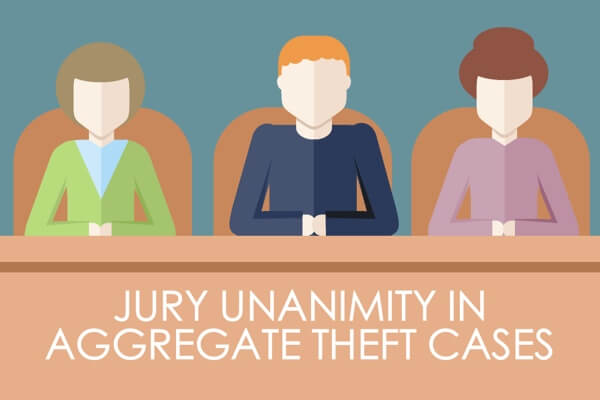
 Jury unanimity is required in every jury trial, whether it be felony or misdemeanor. This means that the jury must unanimously agree that the State has proven or failed to prove all elements of an offense beyond a reasonable doubt. If a jury cannot reach a unanimous verdict of guilty or not guilty, then the judge will declare a mistrial. With some offenses, however, it can be a little unclear as to what jury unanimity actually requires. This is specifically so with aggregated theft cases.
Jury unanimity is required in every jury trial, whether it be felony or misdemeanor. This means that the jury must unanimously agree that the State has proven or failed to prove all elements of an offense beyond a reasonable doubt. If a jury cannot reach a unanimous verdict of guilty or not guilty, then the judge will declare a mistrial. With some offenses, however, it can be a little unclear as to what jury unanimity actually requires. This is specifically so with aggregated theft cases.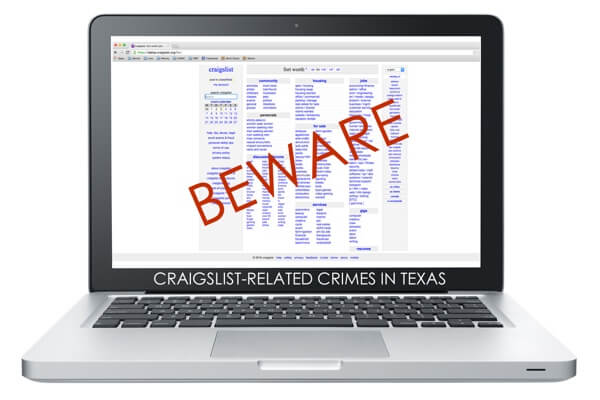
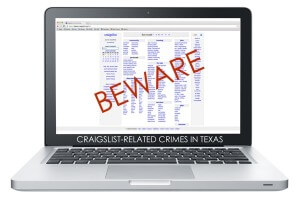 Gone are the days of flipping through your local newspaper’s classified section and circling your favorite ads. These days, Craigslist is the new classifieds of Fort Worth and Dallas. It is the one stop shop source to find a new car, truck, job, furniture, garage sale, or even a love interest. With the rise of Craigslist (and other online forums), there has also been an increase in criminal activity ranging from online scams to fraud and theft. Police stings based on advertisements from Craigslist are also common. Police have seen such a meteoric rise in these “Craigslist related crimes”, that many departments have established “safe exchange locations where transactions can occur under the watchful eye of local law enforcement.
Gone are the days of flipping through your local newspaper’s classified section and circling your favorite ads. These days, Craigslist is the new classifieds of Fort Worth and Dallas. It is the one stop shop source to find a new car, truck, job, furniture, garage sale, or even a love interest. With the rise of Craigslist (and other online forums), there has also been an increase in criminal activity ranging from online scams to fraud and theft. Police stings based on advertisements from Craigslist are also common. Police have seen such a meteoric rise in these “Craigslist related crimes”, that many departments have established “safe exchange locations where transactions can occur under the watchful eye of local law enforcement.
 Our firm has represented many defendants in Fort Worth with cases stemming from a bait car or a Backpage ad. For those of you not familiar with either, let me explain Bait Cars and Backpage.
Our firm has represented many defendants in Fort Worth with cases stemming from a bait car or a Backpage ad. For those of you not familiar with either, let me explain Bait Cars and Backpage.
 In
In 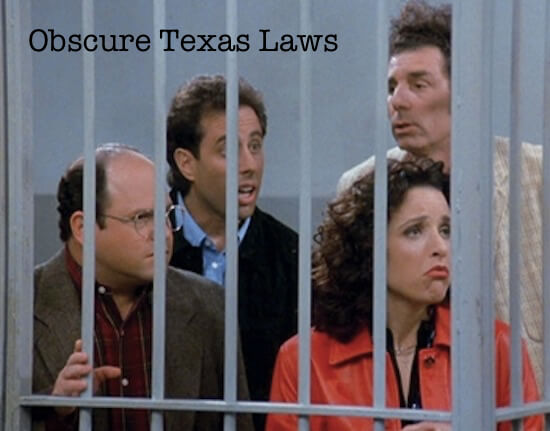
 No, I’m not talking about a Good Samaritan Law, but Texas does have some obscure laws on the books that you might not suspect. We are hoping to bring some of them to your attention. For the first obscure Texas law, we look to one of the most successful television shows in history.
No, I’m not talking about a Good Samaritan Law, but Texas does have some obscure laws on the books that you might not suspect. We are hoping to bring some of them to your attention. For the first obscure Texas law, we look to one of the most successful television shows in history.





